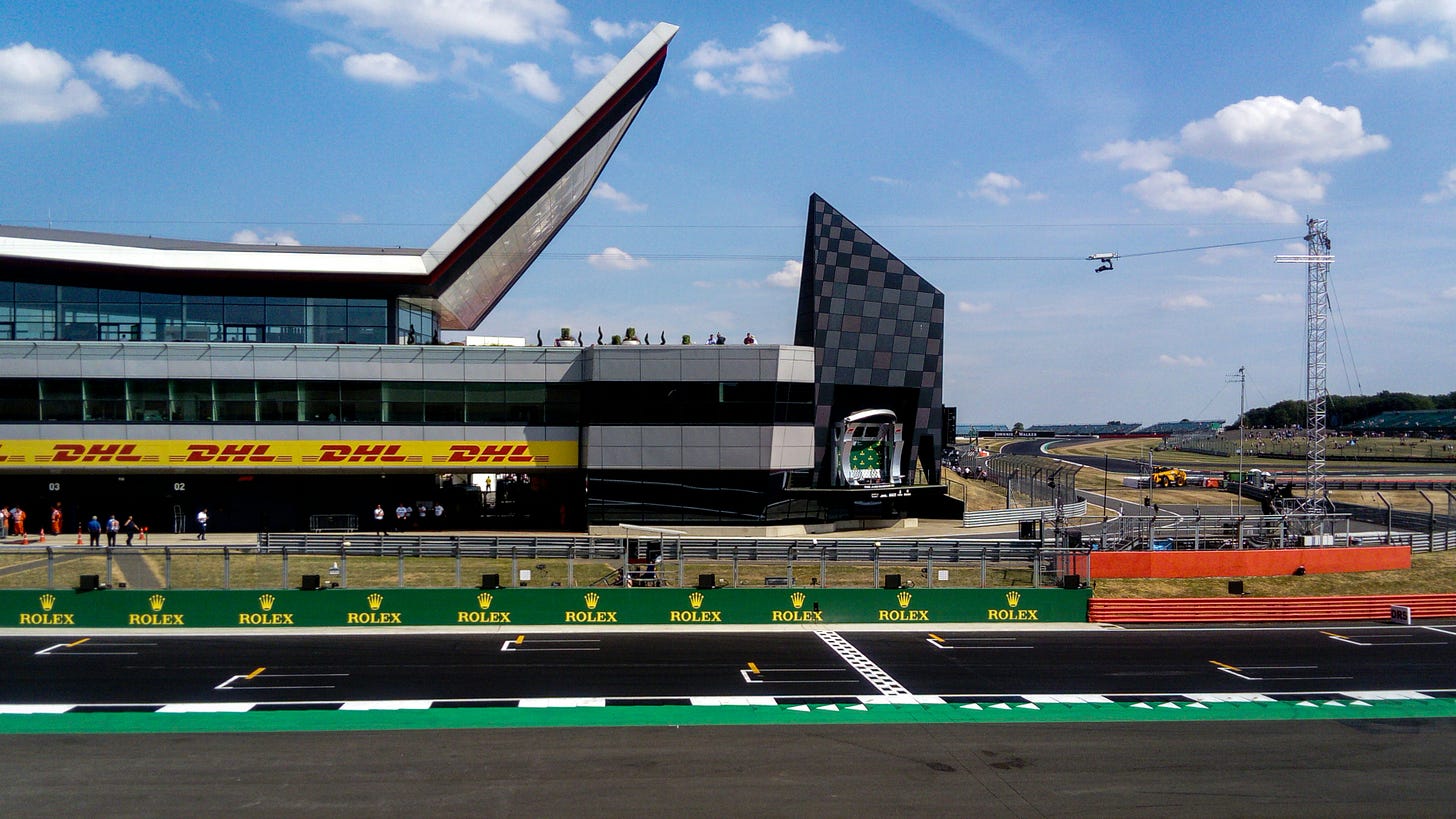Green Speed: F1's Race Towards Sustainability
Unveiling the high-octane drive to eco-friendly innovation in the most popular motorsport
The First Lap
In the world of Formula 1, where cutting-edge technology meets breakneck speeds, a new race is underway – the sprint towards sustainability. In 2019, Formula 1 launched an ambitious plan to become Net Zero Carbon by 2030, marking a significant shift in the sport's environmental approach. This initiative came in response to a comprehensive report that revealed F1's substantial environmental impact: a staggering 256,000 tonnes of CO2 emissions generated during the 2019 season alone.
As we near the midpoint of 2024, it's time to take stock of F1's progress in this crucial endeavour. From revolutionary power unit designs to sustainable fuels, and from eco-friendly circuit operations to advanced recycling programs, F1 is leveraging its legendary innovative spirit to drive positive change. In this newsletter, we'll explore the various strategies and technologies F1 is employing to meet its ambitious 2030 target, showcasing how the pinnacle of motorsport is rapidly becoming a leader in sustainable practices.
Carbon Footprint Breakdown: F1's Environmental Challenge
The 2019 report on F1's environmental impact revealed a significant carbon footprint of 256,000 tonnes of CO2 emissions for that season. Let's break down the main contributors to these numbers:
Logistics and Travel (45%): The largest share of emissions comes from moving freight around the world and transporting personnel to races. This includes air, sea, and road transport for cars, equipment, and team members.
Factories and Facilities (19%): F1 teams' high-tech facilities, including wind tunnels and advanced manufacturing processes, contribute substantially to the overall carbon footprint.
Power Unit and Fuel Usage (0.7%): Surprisingly, the actual on-track action accounts for a relatively small portion of F1's emissions. This highlights the efficiency of modern F1 power units.
Event Operations (7%): Running Grand Prix events, including energy use at circuits and temporary infrastructures, adds to the carbon footprint.
Business Travel (28%): Team personnel, F1 staff, and partners traveling to races and events throughout the season contribute significantly to emissions.
To address these challenges, F1 launched its Net Zero Carbon by 2030 initiative in 2019. Key strategies include:
Transitioning to 100% renewably powered offices, facilities, and factories
Ensuring all F1 events are sustainable by 2025
Incentivising fans to use greener forms of transport to races
Developing advanced sustainable fuels for F1 cars, which could have wider automotive industry applications
As we delve deeper into F1's sustainability journey, it's clear that the sport is taking a comprehensive approach to reducing its carbon footprint across all aspects of its operations.
Sustainable Innovations: F1's Green Revolution
Formula 1's commitment to sustainability extends far beyond the racetrack, encompassing every aspect of the sport's operations. Let's explore some of the key initiatives driving F1's eco-friendly transformation:
1. Renewable Energy at Circuits:
F1 is making significant strides in powering its races with clean energy. Notable examples include:
• Paul Ricard and Circuit Gilles Villeneuve: Solar panels installed at these tracks generate enough year-round energy to offset the entire Grand Prix weekend.
• Circuit de Catalunya and Sakhir International Circuit: These venues are now 100% renewably powered, setting a new standard for sustainable motorsport facilities.
2. Sustainable Team Facilities:
The push for sustainability extends to team headquarters and F1's corporate offices:
• F1's offices now run on 100% renewable energy, leading by example in the transition to clean power.
• Teams are actively working to make their facilities more sustainable, implementing energy-efficient technologies and waste reduction strategies.
3. Lenovo's Asset Recovery Services (ARS):
F1 has partnered with Lenovo to address the challenge of electronic waste:
• Lenovo's ARS helps F1 develop and implement a sustainable disposition strategy for technology hardware.
• This initiative not only offsets the cost of technology refreshes but also ensures secure data destruction.
• By recycling tech in a socially and environmentally responsible way, F1 is making significant progress towards its sustainability goals.
4. Revolutionary Sustainable Fuels: Perhaps the most exciting development is in the realm of race fuel:
• From 2026, F1 cars will run on 100% sustainable fuels, a groundbreaking shift in motorsport.
• These advanced fuels, also known as e-fuels or synthetic fuels, are composed of components derived from:
- Approved carbon capture schemes
- Municipal waste
- Non-food biomass
• The sustainable fuels must achieve a greenhouse gas saving at least equal to the current Renewable Energy Directive (RED) standards.
• This innovation not only reduces F1's carbon footprint but also has the potential to influence the wider automotive industry, driving the adoption of sustainable fuels in everyday vehicles.
5. Waste Reduction and Recycling:
F1 is implementing comprehensive waste management strategies:
• Many circuits are adopting zero-waste-to-landfill policies.
• Enhanced recycling programs are being rolled out across events and team operations.
6. Sustainable Transportation:
Efforts are being made to reduce the carbon footprint of logistics:
• F1 is exploring more efficient freight transportation methods.
• Teams are optimising their travel schedules to reduce unnecessary flights.
These initiatives demonstrate F1's holistic approach to sustainability, leveraging its technological prowess and global influence to drive meaningful environmental change. As the sport continues to innovate, it's not just racing towards a greener future – it's actively shaping it, proving that high performance and sustainability can go hand in hand.
Future Focus: Sustainable Innovations at F1 Circuits
As Formula 1 races towards its sustainability goals, individual circuits are emerging as powerhouses of eco-friendly innovation. Let's explore some of the cutting-edge initiatives being implemented around the world:
Singapore Grand Prix:
Identified that 96% of total emissions came from energy use in 2022
Solution: Installation of solar panels and plans to transition generators to vegetable oil biofuel
Impact: Expected to reduce total emissions by an impressive 52%
Austrian Grand Prix:
Implementing low-carbon systems for garages and data operations
Showcasing how high-performance racing can coexist with energy efficiency
Spanish Grand Prix:
Trialing battery power for media areas
Plans to host F1 in Madrid from 2026, aiming to reduce travel-related carbon footprint
Encouraging cities to adopt greener energy and public transportation solutions
Bahrain Grand Prix:
Implemented advanced building management systems, including:
Efficient HVAC systems
LED lighting
5 million kWh solar park
Digitised signage and traffic systems
Result: Over 30% energy savings in the previous year
Global Logistics: DHL Partnership
Utilisation of biofuel-powered trucks for equipment transportation in Europe
Deployment of solar-powered motorhomes at select circuits
Use of more fuel-efficient aircraft for long-distance transportation
These initiatives demonstrate how F1 circuits are not just venues for racing, but also living laboratories for sustainable technologies. From energy production to waste management, each Grand Prix is becoming a showcase for green innovation, setting new standards for large-scale sporting events worldwide.
F1's Sustainability Roadmap: Key Milestones
As we look to the future, let's recap F1's ambitious sustainability goals and the key milestones they aim to achieve:
By 2025:
Ensure all F1 events are sustainable
Implement significant waste reduction and recycling programs across all races
Transition the majority of circuit operations to renewable energy sources
By 2026:
Introduction of 100% sustainable fuels in F1 cars
Significant increase in electrical power in hybrid powertrains
Host more races in urban centers to reduce travel-related emissions
By 2030:
Achieve Net Zero Carbon status across the entire F1 operations
Complete transition to 100% renewably powered offices, facilities, and factories
Establish F1 as a global leader in sustainable motorsport and technology innovation
These goals reflect F1's commitment to not only reducing its own environmental impact, but also driving wider change in the automotive and event management industries. By leveraging its global platform and technological expertise, Formula 1 is positioning itself at the forefront of the race towards a sustainable future in sports and beyond.
The Final Lap: Accelerating Towards a Sustainable Future
From the sun-powered circuits of Singapore and Bahrain to the revolutionary sustainable fuels powering the 2026 cars, the sport is rapidly transforming itself into a global leader in eco-friendly innovation.
By tackling every aspect of its operations, from logistics and facilities to race-day activities, F1 is demonstrating that high-performance motorsport and environmental responsibility can not only coexist, but thrive in perfect harmony. The sport's ambitious 2030 Net Zero Carbon target is a bold statement of intent, one that is already yielding tangible results through initiatives like Lenovo's Asset Recovery Services and the transition to renewable energy sources.
As Formula 1 continues to push the boundaries of sustainable technology, it's important that we all get behind this green revolution. Share this newsletter with your fellow sportstech enthusiasts and eco-conscious fans – together, we can amplify the impact of F1's sustainability journey and inspire others to follow suit.
Next up in our series: A deep dive into cutting-edge technologies transforming the fan experience in sports stadiums around the world. From immersive augmented reality to next-gen connectivity, we'll explore how venues are enhancing the way we engage with live events. Stay tuned for an inside look at the future of sports stadiums!






